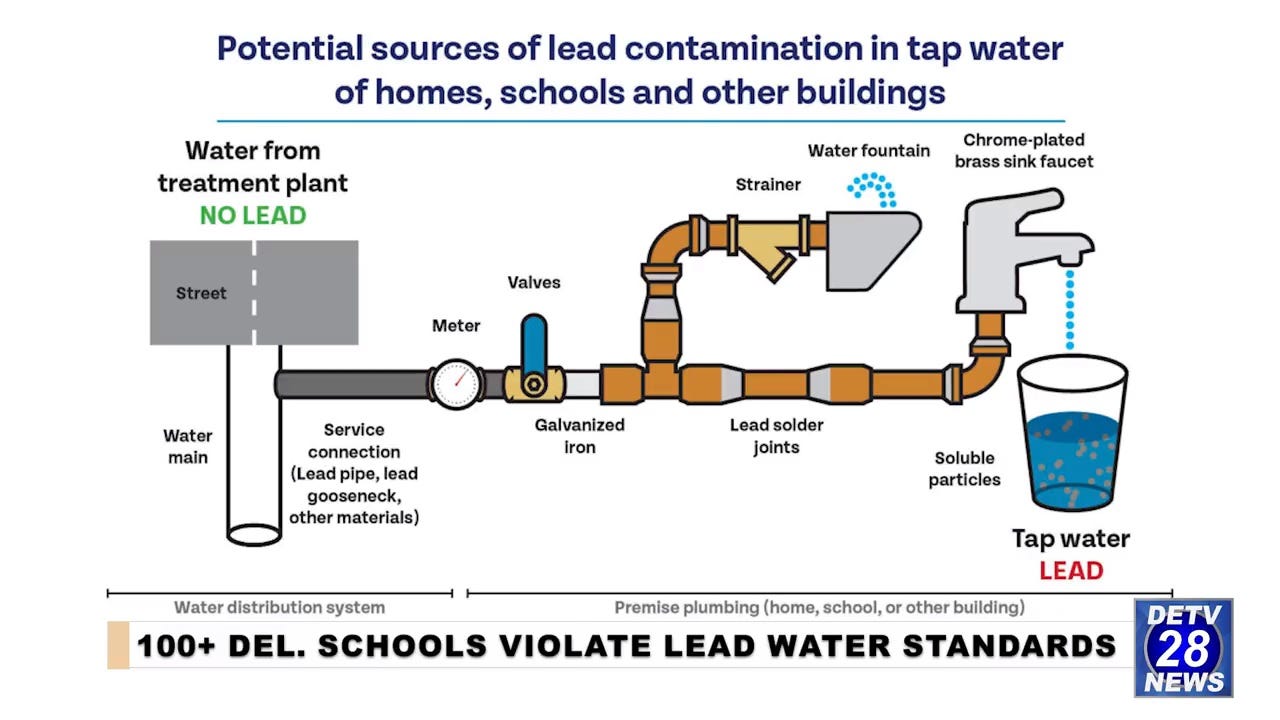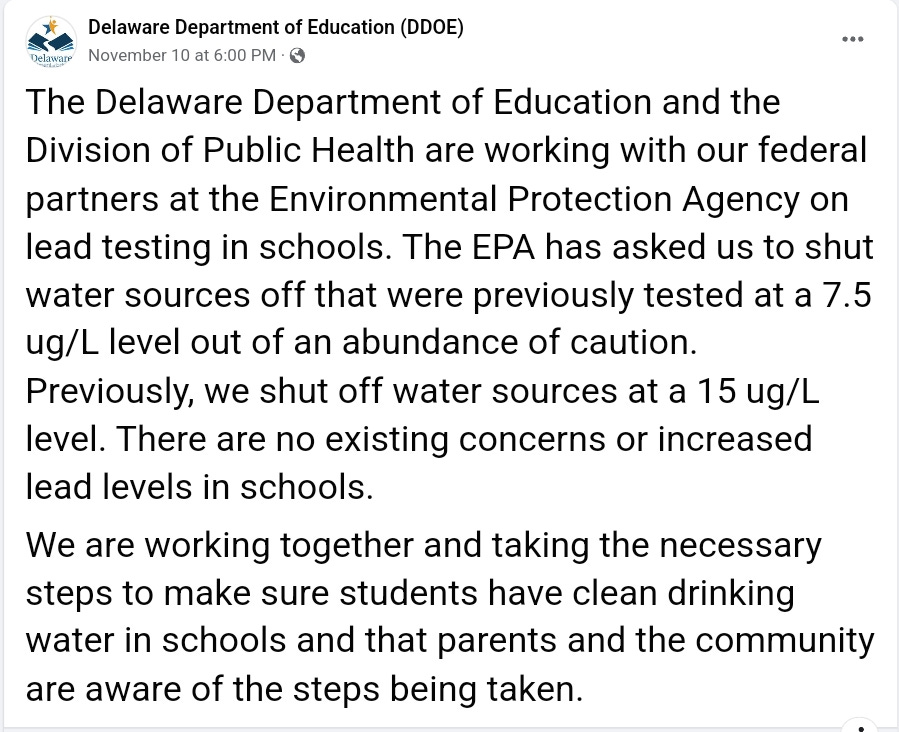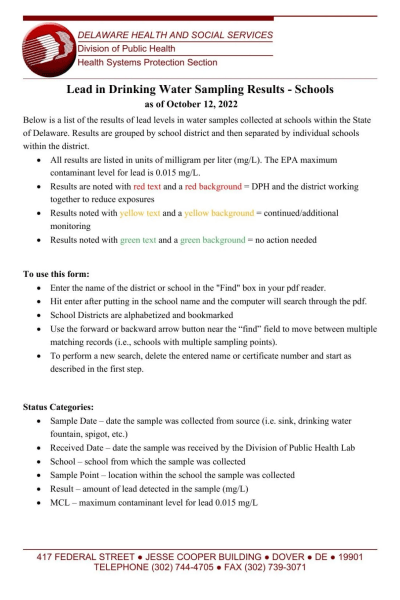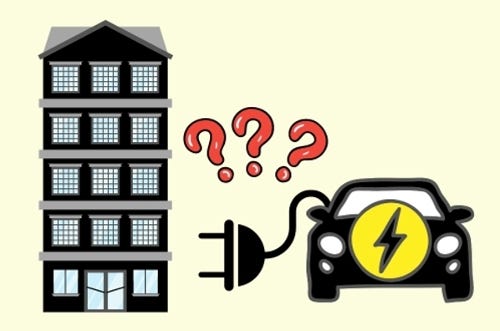[Update] Lead in Delaware Schools Water Supply
Lead-Free Delaware & ACLU call on state to install water filters in schools by January 1st
Just over a year ago Delaware News Journal reported that elevated lead levels in water were found at nearly 50 Delaware schools.
Lead levels tested from one water fountain outside a classroom came back nine times higher than acceptable levels.

Since that initial reporting, the extend to which our Delaware Government hid the reports from Delaware citizens has been exposed.1
Delaware began testing school water samples in late-2020 for elevated levels of lead.
Schools were not made aware of the results of the testing until May 2022, over a year after most schools collected samples.
Despite concerns expressed by school facilities managers about the testing methodology and lack of communication, state officials denied problems.
Delaware continued to deny accountability for the botched program until the EPA intervened.
The EPA was made aware of Delaware's noncompliance through Delaware Online/The News Journal's reports.
While I find plenty of fault with the ever-expanding, heavy-handed power of the EPA2, in this specific instance it took the EPA to inject a modicum of accountability. (Albeit, not without News Journal's investigative report)
Delaware Secretary of Education Mark Holodick pledged to install filters in schools, stating Delaware’s commitment to a “Filter First” approach in May 2023. “Filter First” refers to installing filtration systems in schools at all consumption points to proactively address lead contamination. However, rather than reaffirming the commitment to filtering all the drinking water, the DDOE report indicates that only testing points with the highest lead levels will be filtered, shut off, replaced, or have signs indicating that they aren’t safe for consumption. This means that faucets and fountains with up to 7.5 ppb of lead can be left unaltered for children to drink from.

Learn more at Lead-Free Delaware Blog3
Public meeting exposes lack of data supporting claims about childhood lead poisoning
Delaware's Childhood Lead Poisoning Prevention Program Director Kurt Olinger described the paragraph in question as "awkward" and "misleading." Public meeting, Courtesy of the Delaware Department of Health and Social Services
Lead-Free Delaware, ACLU call on state to install water filters in schools by Jan. 14
October 25, 2023 | Delaware Online
A report conducted by the ACLU of Delaware in collaboration with Lead-Free advocates suggested that the measures taken by the Delaware Department of Education to resolve issues surrounding lead-tainted water in schools are “insufficient,” prompting the groups to urge the state to introduce “new, safer drinking water standards for schools by Jan. 1, 2024.”
The announcement to the public wasn’t made in a news release or at a press conference, but instead on the department’s Facebook page.
U.S. Food and Drug Administration has set its standard for lead in bottled water at no more than 5 parts per billion, whereas, in 2016 the American Academy of Pediatrics urged state and local governments should take steps to ensure that water fountains in schools do not exceed water lead concentrations of 1 part per billion.
🚰 Lead Exposure Linked to 5.5 Million Heart Disease Deaths, Loss of 5.9 IQ Points in Kids Under 55
October 23, 2023 | Children's Health Defense
The health and economic effects of lead exposure through contaminated food, soil, water and paint may be 6-7 times higher than previously estimated, according to a report in The Lancet Planetary Health.
High lead exposure has no immediate, obvious symptoms, which is why so many cases go undiagnosed until the damage is done.

Veolia asks customers for help in finding lead service lines6
March 28, 2023 | Delaware LIVE
Veolia, which provides water to more than 100,000 residents in northern New Castle County, this month started a campaign to locate lead service lines.


In the wake of Delaware government incompetence & deception, they scrambled to put together a public forum on the Lead in Delaware Schools. A small amount of credit given to the fact that this was made available & open to public comment. (Although that should be an expectation, not a hopeful response) I recorded this meeting with the comments shown on screen to give context to what our representative are speaking to.
State health and education officials tried to make public schools their scapegoat, but the people were not having it. Ultimately, Delaware officials admit rules were not followed.
CLIP: [Wilson Elementary] Mother's child tests positive for Lead - two more children awaiting blood results. Mother says the fountains were not closed until the day of this forum.
CLIP: Caller calls out the state's incompetency and pathetic passing of blame to the school districts
Flawed Assumptions Undermine Gasoline-Powered Car Ban Regulation
Delaware Department of Natural Resources and Environmental Control (DNREC) is Delaware's Environmental Agency.
There are several other mistaken assumptions and real concerns that DNREC is not taking into consideration, which include the following:
1) The cost of EVs will decrease as battery costs decrease. DNREC uses a California estimate battery prices will fall to $59 per kWh by 2034. Still, the EIA says $130.00, with the premium price of a vehicle dropping from about $13,000 to $6,000. Both estimates may be wrong as battery costs actually rose 7% from 2021 to 2022 because of higher material costs and the historic trend to lower battery prices appears to be at its end.
2) The Ford 150 pickup EV has a distance range of about 280 miles that drops significantly to 90 miles with a 7,000 pound-trailer attached. This is unacceptable for small businesses and campers.
3) DNREC estimates a $30 million Highway Trust Fund loss from fewer gas-powered vehicles paying a gas tax but is not putting an alternative in place.
4) The spontaneous combustion of batteries after an accident are very hot, difficult-to-control fires that are left to the Fire Department to figure out. DNREC has shown no effort to support training or research on this topic.
5) Similarly, DNREC is moving forward despite no definitive answer about requiring battery recycling or stopping child labor and bad environmental practices at foreign material mines.
6) Our regional grid operator has issued a warning about an electricity shortfall as early as 2026, but DNREC isn't letting that stop the increase in electric demand to charge batteries.
7) DNERC's own survey shows 60% of the population is not interested in buying an EV, and two other studies showed that 73% and 80% oppose this EV mandate.











